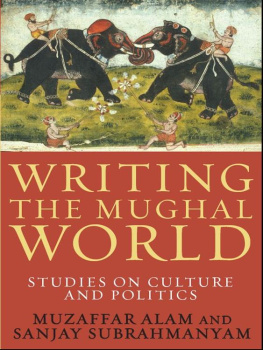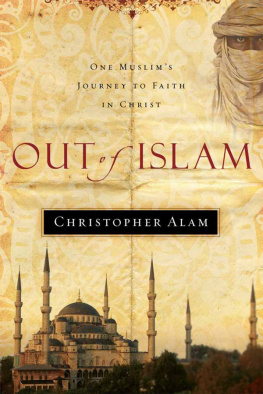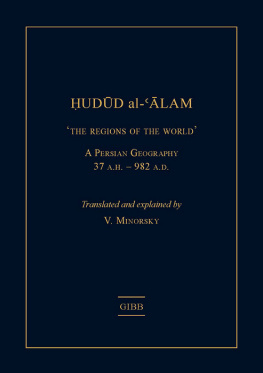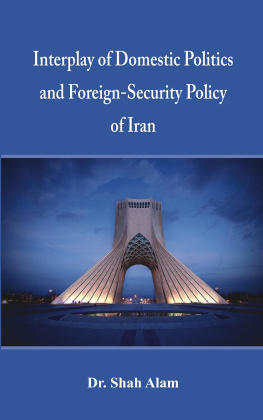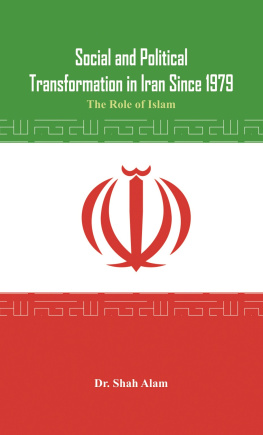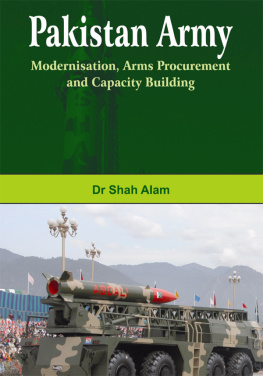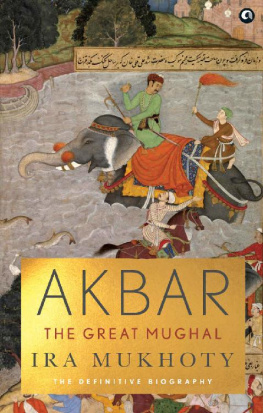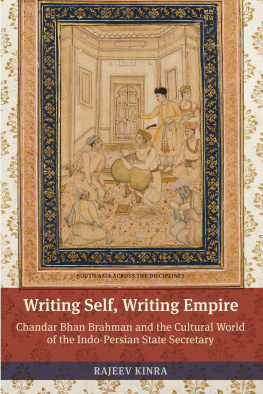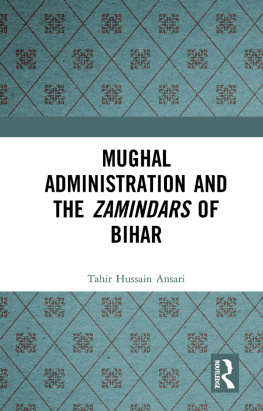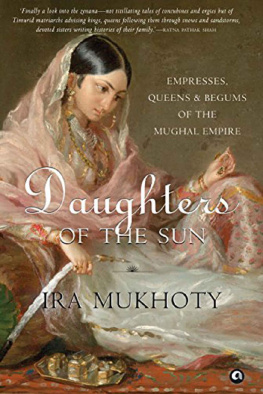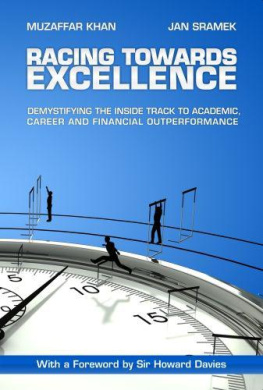
Writing the Mughal World
Writing the Mughal World
Studies on Culture and Politics
Muzaffar Alam
Sanjay Subrahmanyam
Columbia University Press New York
Columbia University Press
Publishers Since 1893
New York Chichester, West Sussex
cup.columbia.edu
Copyright 2012 Columbia University Press
All rights reserved
E-ISBN 978-0-231-52790-3
Library of Congress Cataloging-in-Publication Data
Alam, Muzaffar, 1947
Writing the Mughal world : studies on culture and politics /
Muzaffar Alam and Sanjay Subrahmanyam.
p. cm.
Includes bibliographical references and index.
ISBN 978-0-231-15810-7 (cloth : acid-free paper)
ISBN 978-0-231-15811-4 (paper : acid-free paper)
ISBN 978-0-231-52790-3 (ebook)
1. Mogul EmpireHistory. 2. Mogul EmpireHistoriography.
3. Politics and cultureMogul EmpireHistory. 4. Mogul Empire
Politics and government. 5. Mogul EmpireCommerceHistory.
I. Subrahmanyam, Sanjay. II. Title.
DS461.A43 2011
954.025072dc22 2011012092
A Columbia University Press E-book.
CUP would be pleased to hear about your reading experience with this e-book at .
References to Internet Web sites (URLs) were accurate at the time of writing. Neither the author nor Columbia University Press is responsible for URLs that may have expired or changed since the manuscript was prepared.
for
Caroline and Rizwana
their patience and good humour
CONTENTS
A s a rule historians do not really collaborate. This is a simple empirical fact that some scholar will one day take the trouble to explain systematically. To be sure, there are exceptions to this rule (our friends Polly OHanlon and David Washbrook, to take an example) but they are rare and episodic rather than sustained, let alone programmatic. The obvious reasons for this absence are not far to seek. The foundational myths of the modern discipline are heroic in nature and therefore demand individual rather than twinned effort. So the individual voice is given inordinate weight; this is also the case in the sister discipline of anthropology. Where collaboration exists, it is often hierarchical and fraught with all the unpleasant tension that hierarchy brings in the allegedly egalitarian societies of the modern day, so it rarely lasts. All this is very well, but it still falls quite short of a proper explanation for the absence of joint authorship in history in general as well as Indian history in particular.
Nevertheless, the publication of this particular book will mark roughly two decades of collaborative endeavour and a quarter of a century (give or take) from the time that its two authors first were introduced. There is surely an appropriate irony in the fact that the authors of this volume first met not in Delhiwhere they both lived at the timebut in Yogyakarta in central Java, on the occasion of a conference on The Ancien Rgime in India and Indonesia held at the Universitas Gadjah Mada in the mid-1980s. It was a measure of the strange symbolic distance that obtained at the time between Jawaharlal Nehru University (or JNU, where Alam taught) and the Delhi School of Economics (where Subrahmanyam taught), bridged episodically by seminars at the Teen Murti Library, where we would later also meet other common friends: the late Dharma Kumar (who was responsible for bringing us both to Yogyakarta), Neeladri Bhattacharya, Sabyasachi Bhattacharya, and many others. A hiatus then ensued after 1987, and we resumed close contact in the early months of 1989 at another seminar in the India International Centre (New Delhi). The Indian postal service was at the time still capable of delivering postcards somewhat efficiently, all the better for the telephones at the Delhi School hardly worked. Mediated by postcards, many rich conversations followed in Dakshinapuram on the JNU campus, not with any particular purpose in mind. At least half a generation separated us, to say nothing of vast differences in background, adab, training, and a host of other issues. Yet it was evident to both of us from the very start that there was really something important to be gained if we managed somehow to combine our very different skills, perspectives, and sensibilities.
This became all the more obvious to us during the first half of the 1990s. In May 1990, we were both invited by our friend in common, Suraiya Faroqhi (the Indo-German historian of the Ottomans), to a conference on The State, Decentralisation and Tax-Farming, 15001850: The Ottoman Empire, Iran, and India, at the University of Munich. Here we met Cornell Fleischer, Murat Cizaka, Salih zbaran, Ariel Salzmann, and a host of other historians who startled us out of the last vestiges of our Indocentric complacency. The next year we travelled a vast distance together from Delhi via Frankfurt to attend a conference at Harvard University on a similar theme, this one organized by Tosun Aricanli and Ashraf Ghani. The need to define our positions in the face of colleagues like Cemal Kafadar, who were working on Iranian and Ottoman history, sharpened our collaborative urge as did challenging conversations with our South Asianist colleagues John Richards and Burton Stein. It was probably this logic which eventually led us to publish our first joint essay: Ltat Moghol et sa fiscalit (XVIeXVIIIe sicles), Annales HSS, 1994, no. 1, pp. 189-217.
That essay, which we do not reproduce here, eventually formed the seedling from which we developed the long introduction to our jointly edited volume The Mughal State, 15261750 (1998). We also went on from the essay in the Annales to work in the mid-1990s in Delhi and Leiden on a series of essays on Indo-Persian travel accounts, which in turn eventually allowed us in 2007 to publish a collaborative book entitled Indo-Persian Travels in the Age of Discoveries, 14001800. To date, besides these two books, we have published over a score of joint essays, and it is from this corpus that we have constituted the present volume. (Within which all passages translated into English, unless otherwise specified, are by us.) We have, however, excluded a certain number of essays which we hope will eventually be drawn upon for a second volume on travels in Mughal India.
Apart from our perceptive older friends Burt Stein and John Richards (both of whom are sadly no longer with us), it may frankly be said that our collaboration has met with a mixed reception. This of course excluded our dear friends Velcheru Narayana Rao and David Shulman, who have always known from their own practice what collaborative authorship is all about. Still our constant supporter has been Rizwana Khatun, who has also been the closest and most understanding witness of the shifting terms of our collaboration. In the past decade, Caroline has also happily participated in the complex dealings that have taken us to Paris, Istanbul, Orccha, and Delhi, but also to the icy chills of Chicago in early February.
We also owe thanks to a number of our other friends and colleagues who have helped by giving us bibliographical aid, loaning us books and copying obscure essays, and by commenting perceptively (and sometimes repeatedly) on drafts. These include Manan Ahmed, Ali Anooshahr, the late Jean Aubin, Franoise Aubin, Giancarlo Casale, Partha Chatterjee, the late Simon Digby, Shamsur Rahman Faruqi, Jorge Flores, Caroline Ford, Carlo Ginzburg, Jos Gommans, Nile Green, Rajeev Kinra, Sunil Kumar, C.M. Naim, Velcheru Narayana Rao, Arif Naushahi, Polly OHanlon, Salih zbaran, and Lus Filipe Thomaz. The comments of two anonymous referees for Columbia University Press helped us make final revisions to this text. Finally, a special word of thanks to our Lucknowi friend Rukun Advani, by now a co-conspirator of long standing.
Next page



